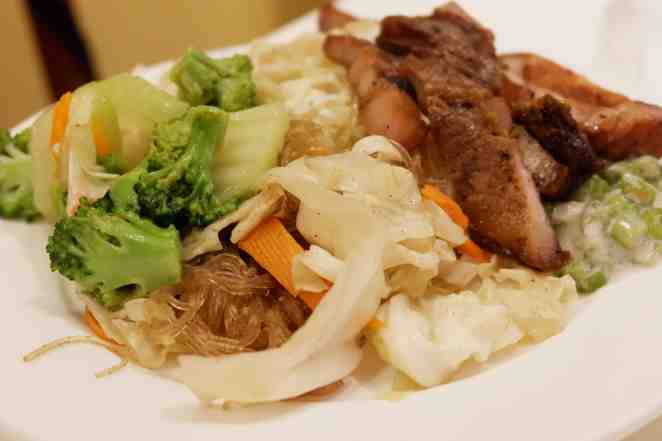
Optimize Your Diet
When the decision arrives that it is time to get fit, the diet may or may not receive attention. This attention is manifest in several forms:
- I am exercising more therefore I just need to eat more calories so I have the energy to continue. These are the people who believe it doesn’t matter what you eat as long as you “burn” it off. This attitude shows a serious disregard for the understanding of human nutrition requirements and there are many examples of failure from this attitude. Or:
- I am exercising more so I must be sure to consume adequate nutrition to build, recover and avoid illness. This is the sensible attitude but often full of misconceptions about what is healthy and wise. Or:
- I am exercising like an athlete so I need to start using those special Sports Nutrition products advertised in the magazines. This may be true but don’t believe everything the ads say and understand that no single product is going to be the solution to all your problems.
Some or part of each of these scenarios is correct. Naturally I will explain which parts and add a few caveats and details.
So let’s begin with understanding that Nutrition for Exercise and Sport begins in the grocery store and your kitchen. You require a plan and some understanding of what the body needs in the way of nutrients to optimize health and performance. Here is a list of concepts to use as guiding lights to understand your nutritional needs.
- During rest and mild to moderate exercise (the kind of exercise in most fitness programs) 65 - 85% of our energy metabolism is from fat. Fat is the “energy source” of choice.
- Even during Marathon pace and duration, at least 50% of the energy is from fat.
- The only time high carbohydrate diets and carbohydrate loading may be implicated is during very long and intense exercise (in excess of 1½ hours). Then and only then is muscle glycogen depletion a limiting factor and correcting such depletion requires extra carbohydrates.
- Chronically high carbohydrate diets lead to chronically elevated insulin levels (the fat storage hormone) and that leads to:
- Weight gain
- Elevated:
- Cholesterol
- Tri-glycerides
- Blood pressure
- Inflammatory conditions
- Eczema
- Psoriases
- Migraines
- Asthma
- Arthritis
- We require a supply of good fats (essential fatty acids or EFA’s) to metabolize other fats and to avoid the inflammatory problems just listed. If fat intake falls below 30% of calories there is no way one can get the EFA’s required. Beware of low fat diets.
- Not all "Sports Nutrition" products are needed, wise nor safe. Nutrition refers to nutrients required for performance like walking, talking, thinking and exercising, building and repair or recovery. Nutrition does not include un-natural – chemistry lab created concoctions that alter, over-stimulate or suppress natural processes and functions. Having said that, there are reliable and responsible Sports Nutrition products that are nutritious, natural, recommended and required. These include:
- High quality protein supplements
- Some designed to provide cell building material
- Some are meal replacements
- Some are designed for muscle glycogen recovery
- Each one is different and none can do all three functions.
- Energy bars or sports bars
- Some high carbohydrate versions do improve endurance performance
- Some are merely meal replacements.
- Some of the higher protein versions are a convenient way to increase protein intake if required.
- Sports Drinks are designed to help replace fluid loss, electrolyte loss and provide extra carbohydrates when needed. There is a great range of quality here. The carbohydrate component of a quality drink will be “maltodextrin” (a glucose polymer) and the electrolyte list will contain 6 – 8 electrolytes like calcium, phosphorous, chloride, sodium, potassium, and magnesium, not just sodium and potassium.
- High quality protein supplements
- There is no evidence that muscle glycogen (the muscle storage form of glucose) depletion is ever the limiting factor in performance in short (less than 1½ hours) term, sub-maximal intensity exercise. There is also no evidence that a muscle “full” of glycogen will out perform a muscle that is “half-full” – except in long, high intensity endurance events.
- Exercise does increase “free radical” damage, which challenges our immune systems. (One survey showed that 35 – 40% of Marathon finishers get sick within one week of the race completion). Our best-known free radical scavengers are the anti-oxidants like vitamins A, C, E plus beta-carotene, selenium and the “proanthocyanidins” found in grape seed extract. All this is a strong case for eating lots of colorful fruits and vegetables.
- Responsible supplementation with vitamins, minerals, essential fatty acids, fiber and protein is not an option if you wish to experience optimal health, fitness and performance. The explanation for this concept is much longer a few sentences but I do devote a complete chapter to the subject in my book “Fat Won’t Make You Fat”.
All of this means that the optimal diet for the healthy and fit will contain lots of colorful fruits and vegetables, lots of high quality proteins, responsible supplements and selective use of Sports bars and drinks. My personal choice for food selection is an eating plan of 40% carbohydrates (primarily from fruits and vegetables – less from grains), 30% high quality protein (some from supplements) and 30% fat (10% essential fats – some from supplements, 10% mono-unsaturated fat like olive oil and sesame oil and 10% saturated fat). I also recommend a quality multi-vitamin/mineral supplement, extra anti-oxidant supplements and some fiber supplementation.
Previous in Nutrition: Nutrition Jargon
Next in Nutrition: Optimal Nutrition